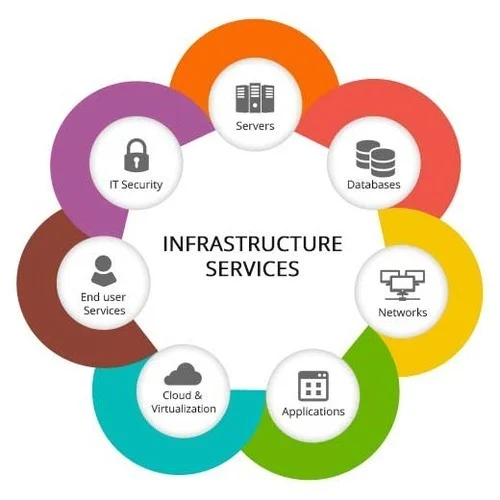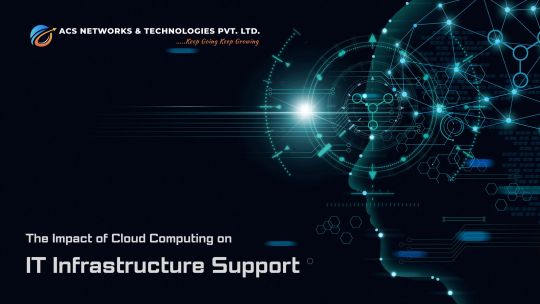#IT Infrastructure Management
Explore tagged Tumblr posts
Text
What Are the Key Roles in IT Infrastructure Management?
In the modern business age of the digital world, IT Infrastructure Management is what keeps businesses running well. The task of IT infrastructure management entails efforts made in diverse areas, including the maintenance of network performance and protection of the data security. But what are exactly the major roles that make this ecosystem to be efficient?
What are the most central positions and responsibilities that propel up a reliable, safe and scalable IT infrastructure? Let us go over them at a time.

1. IT Infrastructure Manager
The head of the ladder is IT Infrastructure Manager. Such an individual is involved in planning, designing and executing the whole IT infrastructure of an organization. They make sure that every hardware, software, network as well as cloud-based service are in line with business objectives.
They have day to day tasks of budgeting IT resources, vendor selection, team management, decisions on upgrade or change of systems among others. They also liaise with the top level management to ensure that the roadmap of the infrastructure matches the growth strategies of the business.
2. Network Administrator
The Network Administrator has the duty to maintain the network systems in the company. These are local area networks (LAN), wide area networks (WAN), firewalls, routers and switches. It is their task to maintain continuous connectivity and solve any problems connected with network performance.
They can be found in the background, doing software update and vulnerability patching and management, and uptime. Businesses would be experiencing constant blackouts and jeopardized security without network administrators.
3. System Administrator
System Administrators are often mixed up with the network administrators, but they take more attention to the machines, operating systems and servers. They administer, modify, and guarantee stable performance of the computer systems particularly the multi-user computers such as servers.
General system admins are involved in a user setup, maintenance of accesses, backup, and system status. They also do software upgrades and repair hardware.
4. Database Administrator (DBA)
Most businesses rely on data in the world today. Database Administrator makes sure that vital information is stored, retrieved, and secured in a streamlined way. They keep up database platforms such as Oracle, SQL Server or MySQL, according to the requirements of the organization.
They clean up performances, configure backup and recovery procedures, apply data access control, and observe storage. They also collaborate with security departments in ensuring they guard information that may be accessed or lost without authorization.
5. Cloud Infrastructure Engineer
As other enterprises increasingly migrate to the cloud, the importance of a Cloud Infrastructure Engineer has gotten significant adoption. Such experts control systems operating in the cloud: AWS, Azure or Google Cloud.
They are to implement virtual servers, allow cloud security, cloud cost optimization, and deployment automation. They make sure that the organization takes advantage of the use of cloud technology in an effective way that neither performance nor security is affected.
6. IT Security Specialist
Cybersecurity is not an option anymore. IT Security Specialist is specialized in ensuring the safety of the infrastructure against threats, breach and vulnerability. They would watch networks and look at certain abnormal activities, use firewalls, and encrypt data, and they would make security audits frequently.
They also teach the other members of the team about good practices and adherence to regulations such as GDPR, HIPAA, etc.
7. Help Desk and Support Teams
The IT Support and Help Desk Teams are the ones who are frequently ignored, but at the same time, his workforce has to be part of the management of an infrastructure. The employees contact them when there are technical problems.
Such specialists are involved in password recovery, installation of software, and assistance. Proper support team eases productivity as issues are solved within the shortest time possible.
Conclusion
IT Infrastructure Management relies on all the diverse jobs dedicated to keep the system stable, performing well, and secure. All the job titles, be they network administrator, system admin, or cloud engineer are essential to guarantee a well-functioning technology foundation of an enterprise. The right team in the right place is not only important, but also necessary as the organizations keep on expanding and changing. Knowledge of these top functions will help businesses to organize their IT departments, prevent their outages, as well as being ready to meet any technological needs in future.
1 note
·
View note
Text
Empower Your Business with Dedicated IT Resources from Quarec Resources Pvt. Ltd.

At Quarec Resources Pvt. Ltd., we provide top-tier Dedicated IT Resources to propel your business forward. Our skilled IT professionals seamlessly integrate with your team, offering expertise in software development, system administration, network management, and more. By choosing our dedicated resources, you gain flexibility, cost-efficiency, and the ability to swiftly adapt to evolving technological demands. Partner with Quarec to ensure your IT operations are robust, scalable, and aligned with your strategic goals.
#Dedicated IT Resources#IT Staff Augmentation#Dedicated IT#Software Development Team#System Administration Services#Network Management Solutions#IT Outsourcing#Remote IT Support#IT Consulting#Cloud Computing Services#Cybersecurity Solutions#Data Analytics Services#IT Project Management#Technical Support Services#IT Infrastructure Management
0 notes
Text
Reliable IT Infrastructure Solutions for Businesses
Vivency Technology LLC specializes in providing cutting-edge IT infrastructure solutions tailored to meet the diverse needs of businesses and organizations. Our services ensure seamless operations, enhanced security, and optimal performance for your IT environment.
We offer a comprehensive range of IT infrastructure services, including: ✅ Network Solutions – Reliable and scalable networking for seamless connectivity. ✅ Data Center Solutions – Advanced data storage, management, and security solutions. ✅ Cybersecurity Solutions – Protect your business with robust security measures. ✅ IT Consulting & Managed Services – Expert guidance and support for IT optimization.
Enhance your IT infrastructure with Vivency Technology LLC. Contact us today for customized solutions!
#IT infrastructure solutions#network solutions#data center solutions#cybersecurity solutions#IT consulting services#managed IT services#business IT solutions#IT infrastructure management#IT support services#enterprise IT solutions#secure IT infrastructure#cloud infrastructure solutions#network security solutions#IT infrastructure company#IT infrastructure provider#scalable IT solutions#technology infrastructure services#IT system integration#IT infrastructure optimization#Vivency Technology LLC.
0 notes
Text
The Role of AI and Automation in IT Infrastructure Management

In today’s rapidly evolving technological landscape, businesses are increasingly relying on cutting-edge solutions to manage their IT infrastructure. Artificial Intelligence (AI) and automation have emerged as game-changers in this space, transforming how companies operate and maintain their IT systems. By integrating these technologies, businesses can enhance efficiency, reduce costs, and ensure seamless operations. Let’s explore how AI and automation are reshaping IT infrastructure management and how managed IT services and outsourcing play a pivotal role.
The Benefits of AI and Automation in IT Infrastructure Management
AI and automation are revolutionizing IT infrastructure services by enabling predictive maintenance, optimizing resource allocation, and ensuring rapid issue resolution. Here are some of the key benefits:
Proactive Issue Detection: AI-powered tools can analyze vast amounts of data to identify potential problems before they escalate, minimizing downtime and ensuring business continuity.
Improved Efficiency: Automation streamlines routine tasks such as system updates, backups, and performance monitoring, freeing up IT teams to focus on strategic initiatives.
Cost Savings: With AI and automation handling repetitive tasks, businesses can reduce labor costs and avoid unnecessary expenses caused by system failures.
Enhanced Security: AI-driven solutions can detect anomalies and respond to cybersecurity threats in real time, ensuring robust protection for IT infrastructure.
Managed IT Services and Outsourcing: A Strategic Choice
While in-house IT teams play a vital role, the complexity of modern IT infrastructure often necessitates external expertise. Managed IT services and outsourcing have become popular choices for businesses looking to optimize their operations without straining internal resources.
Outsourcing IT infrastructure services to experienced providers ensures access to advanced tools and expertise, making it easier to integrate AI and automation. Here’s why many businesses are opting for this approach:
Scalability: Managed IT service providers offer scalable solutions that grow with your business.
Cost-Effectiveness: Outsourced services often provide cost-effective solutions for small and medium-sized businesses (SMBs).
24/7 Support: Access round-the-clock support to handle critical issues promptly.
In-House vs. Outsourced IT Infrastructure Management: Pros and Cons
When deciding between in-house and outsourced IT management, businesses need to weigh the advantages and drawbacks of each option:

How to Choose the Right Managed IT Service Provider for Your Business
Selecting the right managed IT service provider is crucial for leveraging the benefits of AI and automation. Here are some key factors to consider:
Experience and Expertise: Look for providers with a proven track record in managing IT infra services and integrating AI-driven solutions.
Customizable Solutions: Ensure the provider offers tailored services that align with your business needs.
Transparency: A good provider will offer clear communication, detailed service level agreements (SLAs), and regular performance reports.
Key Metrics to Track: Choose a provider that emphasizes tracking metrics such as system uptime, mean time to resolution (MTTR), and cost savings to evaluate the effectiveness of outsourced IT services.
Managed IT Services: Cost-Effective Solutions for SMBs
For SMBs, managed IT services provide a cost-effective way to harness the power of AI and automation. By outsourcing IT infrastructure management, smaller businesses can compete with larger enterprises without the need for significant upfront investments. Managed services offer:
Access to Advanced Technologies: Benefit from AI and automation without the need for expensive in-house development.
Predictable Costs: Fixed monthly fees make budgeting easier for SMBs.
Enhanced Productivity: With IT infrastructure running smoothly, teams can focus on core business activities.
Key Metrics to Track When Outsourcing IT Infrastructure Services
Outsourcing IT infrastructure services can drive measurable benefits, but it’s essential to track the right metrics to gauge success. Key metrics include:
System Uptime: Ensure consistent performance with minimal disruptions.
Mean Time to Resolution (MTTR): Measure the efficiency of issue resolution.
Cost Savings: Track reductions in operational costs compared to in-house management.
Customer Satisfaction: Evaluate how well the IT services align with your business needs.
Conclusion
AI and automation are no longer futuristic concepts but essential tools in modern IT infrastructure management. By embracing these technologies through managed IT services and outsourcing, businesses can achieve greater efficiency, enhanced security, and significant cost savings. Whether you’re a startup or an established enterprise, partnering with the right managed IT service provider ensures that your IT infrastructure evolves to meet the demands of tomorrow.
Reach out to Shvintech to schedule your call. If you’re ready to transform your IT operations, explore Shvintech’s tailored IT infra services. From AI-powered solutions to comprehensive outsourcing, we’re here to help your business thrive. Contact us today for expert advice. Let us help your organization—big or small—achieve higher revenue and business growth while we take care of all your IT challenges.
0 notes
Text
Web Design
Lovell Technologies (Bermuda) is a premiere information technology and digital marketing company with a focus on serving small to medium-size organizations.
0 notes
Text
Through the support of this extensive guide, learn the essential tactics and industry best practices for optimizing the of your IT infrastructure performance. This book covers everything from server efficiency to network optimization the essential elements that go into making an IT environment function efficiently. Whether your company is small or large, learn more about capacity planning, resource allocation, and system monitoring to make sure your infrastructure can handle the demands of the operation. Maximize the potential of your IT infrastructure to promote creativity and productivity with helpful hints and professional guidance.
0 notes
Text
0 notes
Text
Optimizing Operations: The Key Benefits of Infrastructure Management Services
In the modern business landscape, where technology plays a pivotal role in driving growth and innovation, effective infrastructure management is essential for success. From maintaining critical systems to optimizing performance and ensuring reliability, infrastructure management services are instrumental in keeping businesses running smoothly and efficiently. Let's delve into the key benefits of infrastructure management services and how they can help businesses thrive in today's digital world.

Streamlined Operations and Efficiency One of the primary benefits of infrastructure management services is streamlined operations and increased efficiency. By outsourcing the IT infrastructure management to experienced professionals, businesses can focus on their core competencies while ensuring that their systems and networks are operating at peak performance. This allows for improved productivity, reduced downtime, and enhanced business agility.
Proactive Monitoring and Maintenance Infrastructure management services provide proactive monitoring and maintenance of IT systems and networks, allowing potential issues to be identified and addressed before they escalate into major problems. This proactive approach helps minimize downtime, prevent costly outages, and ensure the continuous availability of critical business services.
Scalability and Flexibility As businesses grow and evolve, their IT infrastructure needs may change. Infrastructure management services offer scalability and flexibility, allowing businesses to easily scale their infrastructure up or down to accommodate changing demands. Whether it's adding new servers, expanding storage capacity, or upgrading networking equipment, infrastructure management services provide the agility needed to adapt to evolving business requirements.
Enhanced Security and Compliance Maintaining the security of IT infrastructure is paramount in today's cyber threat landscape. Infrastructure management services include robust security measures to protect against cyber threats, including firewalls, intrusion detection systems, and regular security audits. Additionally, these services help businesses ensure compliance with industry regulations and standards, reducing the risk of costly fines and penalties.
Cost Savings and ROI Outsourcing infrastructure management to a third-party provider can result in significant cost savings for businesses. By eliminating the need for in-house IT staff and reducing the overhead associated with maintaining hardware and software, infrastructure management services offer a cost-effective solution for businesses of all sizes. Additionally, the improved efficiency and productivity gained through infrastructure management services can result in a higher return on investment (ROI) for businesses.
Conclusion: Empowering Businesses with Infrastructure Management Services In conclusion, infrastructure management services play a vital role in helping businesses optimize their IT infrastructure and achieve their goals. From streamlining operations and increasing efficiency to ensuring security and compliance, these services offer a wide range of benefits for businesses seeking to thrive in today's digital world. By partnering with an experienced infrastructure management provider, businesses can unlock the full potential of their IT infrastructure and position themselves for long-term success and growth.
#Server Infra Management#IT Infrastructure Management#infra management services#Infrastructure Management Services
0 notes
Text
Future-Proofing Your Business: Why IT Infrastructure Project Management Matters

Introduction:
In the digital world of today, a business needs a strong IT system to run well. But it's not enough to just have technology. Strategic IT infrastructure project management is what you need to grow and be ready for the difficulties of the future. For your business to be ready for the future, this blog post goes into great detail about why well-planned IT infrastructure projects are so important. We will talk about how good IT project management can help you build a strong base, make the most of cloud strategies, and pick the best IT infrastructure management software. Prepare to learn how to create a strong and flexible IT system that will last the life of your business!
Beyond Basic Upgrades: Strategic IT Infrastructure Projects for Long-Term Growth:
A lot of companies see IT infrastructure projects as a quick way to fix problems, like upgrading old gear or adding more storage space. Even though these upgrades are necessary, a real IT infrastructure plan goes beyond just fixing things. To help your business grow in the long run, use IT infrastructure project management in the following ways:
Pay Attention to Business Alignment: You shouldn't just improve because you can. Align your IT infrastructure projects with the bigger goals of your business. Is your business going into new areas? If you want to use a new CRM system, you might need to make changes to your technology to allow for more data storage and user access.
Accept Automation and Efficiency: IT infrastructure projects can be a great chance to automate boring jobs that need to be done by hand. You might want to use infrastructure management software that can automatically set up servers, handle their configurations, and apply patches. This gives IT staff more time to work on growth-boosting key projects.
Set Goals for Scalability and Flexibility: Your IT system needs to be able to change with the needs of your business. If your business grows, look for options that are easy to expand, so you can add more resources or features. In this case, cloud-based technology can be very helpful because it allows for on-demand scalability and flexibility.
Invest in Security: There are always threats to your online safety. Do not put security last on your list of priorities. Strong security methods should be built into all of your IT infrastructure projects from the start. To do this, you might need to divide the network into sections, secure the data, and set up a zero-trust security model.
Plan for the Future: IT infrastructure project management that works well looks at the big picture. You might want to think about new technologies like AI and machine learning. Your system should be able to connect these technologies so that you can find new ways to grow and innovate. Read more.https://plglobal.com/it-infrastructure-project-management/
#it infrastructure#IT infrastructure management#Infrastructure project management#project management
0 notes
Text
How Goognu's IT Managed Services Revolutionize Operations
In the ever-evolving digital landscape, businesses rely heavily on their IT infrastructure to drive operations and stay competitive. However, managing and maintaining complex IT systems can be a significant challenge, diverting resources and attention from core business functions. This is where Goognu's IT Managed Services step in, revolutionizing operations and empowering businesses to focus on their strategic goals.
Goognu is a trusted provider of comprehensive IT solutions, offering a range of Managed Services that streamline and optimize IT operations. With a team of skilled professionals and cutting-edge technologies, Goognu takes on the responsibility of managing and supporting your IT infrastructure, allowing you to concentrate on what you do best.
One of the key benefits of Goognu's IT Managed Services is their proactive approach. Their team of experts closely monitors your systems, identifying potential issues before they cause disruptions. By addressing issues proactively, they minimize downtime, improve system availability, and maximize productivity. This proactive management approach ensures that your IT infrastructure operates smoothly and efficiently.
0 notes
Text
Empowering Enterprises: A Look into Prosofttech's Innovative IT Solutions

In the fast-paced digital landscape of the 21st century, businesses are increasingly reliant on robust IT infrastructure and cutting-edge technology to drive growth and remain competitive. This is where Prosofttech, established in 2017, steps in as a trusted partner, providing and managing IT services to medium and large enterprises in India and beyond.
Prosofttech's mission is clear: to ensure optimal performance for the IT infrastructure and core applications that organizations rely on for their daily operations. With a focus on clarity and optimal use of IT investments, Prosofttech offers custom-tailored services aimed at helping clients harness the full potential of technology for business growth.
At the heart of Prosofttech's approach lies a commitment to understanding the unique needs and challenges of each client. Rather than adopting a one-size-fits-all approach, Prosofttech begins by conducting a comprehensive technology audit process. This audit is not merely a checklist of technical specifications; instead, it is grounded in the recognition that technology serves as the foundation upon which business objectives are built.
By aligning technology solutions with specific business needs, Prosofttech ensures that clients derive maximum value from their IT investments. Whether it's optimizing network infrastructure, enhancing cybersecurity measures, or streamlining core business applications, Prosofttech's services are designed to drive efficiency, productivity, and innovation.
What sets Prosofttech apart is its focus on collaboration and partnership. Rather than functioning as a mere service provider, Prosofttech strives to become an extension of its clients' teams. This collaborative approach enables Prosofttech to gain a deep understanding of its clients' businesses, allowing them to deliver solutions that are not only technically sound but also strategically aligned with long-term objectives.
Moreover, Prosofttech's commitment to innovation ensures that clients stay ahead of the curve in a rapidly evolving technological landscape. By staying abreast of the latest developments and trends, Prosofttech is able to offer forward-thinking solutions that position clients for success both now and in the future.
In conclusion, Prosofttech's innovative IT solutions are empowering enterprises to thrive in today's digital economy. With a focus on clarity, optimal use of technology, and a commitment to partnership, Prosofttech is not just a service provider but a strategic ally in driving business growth and success.
consulting services
it infrastructure management
Prosofttechs
#virtualization technology#network virtualization#backup services#it infrastructure management#consulting services
0 notes
Text
Key Types of IT Infrastructure Management You Must Know
Today, the efficient operation of any business sits largely on the performance of its IT systems. Maintaining proper performance and health of the IT systems is necessary for both small and large companies. That is why IT Infrastructure Management is important. This involves looking after the important things in IT such as networks, servers, data centers, hardware, and software that maintain operations.
Learning the most important types of IT infrastructure management allows businesses to create IT environments that are strong, steady, and safe. We should look at the key types of verbs you should understand.

1. Network Management
The main aim of network management is to make certain that there are no problems in the way an organization communicates. It includes taking care of routers, switches, firewalls, and checking that your internet is working.
You want to guarantee stability for the network, protect it from any downtime, and spot problems such as network overload or unauthorized attempts as early as possible. By managing the networks well, employees are able to use the needed tools without facing any interruptions.
2. Server Management
The main role of servers is to hold applications, websites, databases, and internal systems in IT. The duties of a server manager are to keep the server running well, install updates, and provide security for it.
Here, the main concern is to avoid server failures, improve the way resource demand is handled, and guide the backup of crucial files. Through good server management, companies lower the risk of losing data and provide safe and convenient services to their clients.
3. Storage Management
For any organization, data is considered a key asset. How data is kept in storage, protected, and then retrieved is what storage management is about. It additionally aims to provide enough storage for all the data and to organize it properly.
When data is stored correctly, it’s less likely to be lost, storage expenses become lower, and speeds of accessing data increase. Usually, it covers creating backups, arranging disaster plans, and keeping confidential information safe.
4. Security Management
Covering IT systems from cyber threats has the highest priority in every business. The purpose of security management is to set up defenses against unauthorized users, harmful viruses, and loss of data.
Among the tasks are: establishing firewalls, supervising antivirus settings, regulating who accesses the system, and also updating security guidelines. When security management is strong, businesses follow regulatory standards and avoid any threats to their finances or reputation.
5. Cloud Infrastructure Management
Given the move to the cloud by a lot of businesses, it is now necessary to handle cloud-based programs. Cloud infrastructure management requires checking, securing, and ensuring the financial efficiency of everything available in the cloud.
This part covers cloud servers, storage, databases, as well as virtual networks. Proper management of cloud services guarantees that the business grows and its data stays secure, and that on-site systems work flawlessly with them.
6. Data Center Management
When a company runs its own data center, it needs to focus on good management. Its purpose is to make sure equipment, power supplies, air conditioning, and security operate effortlessly.
With this method, any issues with servers and storage devices are found and the energy and performance of the data center are checked. If hardware is inspected and maintained regularly, the chance of failure goes down.
7. IT Help Desk Management
It is the responsibility of the IT help desk to guide end-users by solving technical difficulties, granting access to technology, and solving usual problems. This forms the first line of IT support and straightaway influences the level of employee productivity.
An agile IT help desk makes users happy and deals with problems fast, which reduces disruptions to the daily proceedings.
Conclusion
If you are aware of different types of IT Infrastructure Management, it helps make the IT environment secure and high-performing. Every type of security has a special function that helps protect the entire IT infrastructure.
Following these steps allows for managing the network and servers well, so data is always safe and cloud services perform at their best. Infrastructure that is secure and well run shields resources and, at the same time, allows a business to adjust to changing technology advancements.
A solid IT infrastructure management helps companies ensure their systems work well, prevent lengthy downtimes, and make the workplace productive in the long run.
0 notes
Text
IT Consulting: Navigating technological challenges, optimizing systems, and strategizing for digital transformation in businesses worldwide.
Title: Navigating the Dynamics of IT Consulting: A Comprehensive Guide
In the ever-evolving landscape of technology, businesses are continually challenged to keep pace with the latest trends, innovations, and solutions to maintain their competitive edge. This challenge has propelled the significance of IT consulting firms, which offer expertise, guidance, and support in navigating the complexities of the digital realm. From streamlining operations to implementing cutting-edge solutions, IT consultants play a pivotal role in shaping the technological trajectory of organizations across industries.
Understanding IT Consulting:
IT consulting encompasses a broad spectrum of services aimed at assisting businesses in leveraging technology to achieve their objectives efficiently and effectively. These services encompass various domains, including but not limited to:
1. **Strategic Planning**: IT consultants collaborate with stakeholders to develop comprehensive technology strategies aligned with the organization's goals and objectives.
2. **Infrastructure Assessment and Optimization**: Consultants evaluate existing IT infrastructure, identify areas for improvement, and recommend solutions to optimize performance, scalability, and security.
3. **Digital Transformation**: With the rapid digitization of business processes, consultants help organizations embrace digital transformation initiatives to enhance agility, innovation, and customer experience.
4. **Cybersecurity**: In an era of escalating cyber threats, IT consultants devise robust security frameworks, implement preventive measures, and conduct regular audits to safeguard sensitive data and mitigate risks.
5. **Cloud Computing**: Consultants facilitate the migration to cloud-based platforms, enabling businesses to leverage scalable infrastructure, enhance collaboration, and reduce operational costs.
The Role of IT Consultants:
IT consultants serve as trusted advisors, offering insights, expertise, and guidance to help organizations navigate technological challenges and capitalize on emerging opportunities. Their role encompasses the following key aspects:
1. **Needs Assessment**: Consultants conduct thorough assessments to understand the unique requirements, pain points, and objectives of the client organization.
2. **Solution Design**: Based on the assessment, consultants design customized solutions tailored to address specific business challenges and capitalize on opportunities for growth and innovation.
3. **Implementation and Integration**: Consultants oversee the implementation of technology solutions, ensuring seamless integration with existing systems and processes while minimizing disruptions to operations.
4. **Change Management**: Effective change management is critical to the success of any technology initiative. IT consultants facilitate organizational change by fostering buy-in, providing training, and promoting a culture of innovation and continuous improvement.
5. **Performance Monitoring and Optimization**: Post-implementation, consultants monitor the performance of IT systems, identify bottlenecks, and fine-tune configurations to optimize efficiency, reliability, and scalability.
The Value Proposition of IT Consulting:
The value proposition of IT consulting extends beyond technical expertise and encompasses various benefits for client organizations, including:
1. **Access to Specialized Skills**: IT consultants bring a diverse range of skills, experiences, and perspectives to the table, enabling organizations to tap into specialized expertise that may not be available in-house.
2. **Cost Optimization**: By outsourcing IT services to consultants, organizations can minimize overhead costs associated with hiring, training, and retaining full-time employees, while also gaining access to scalable resources and infrastructure.
3. **Strategic Insights**: Consultants offer strategic insights and industry best practices derived from their experiences working with diverse clients across different sectors, empowering organizations to make informed decisions and stay ahead of the curve.
4. **Risk Mitigation**: In an increasingly complex and dynamic technology landscape, IT consultants help mitigate risks associated with technology adoption, compliance, security breaches, and regulatory changes, thereby safeguarding the reputation and continuity of the business.
5. **Enhanced Agility and Innovation**: By leveraging the expertise of IT consultants, organizations can adapt quickly to changing market conditions, embrace emerging technologies, and foster a culture of innovation that drives sustainable growth and competitive advantage.
Challenges and Considerations:
While IT consulting offers numerous benefits, it also presents certain challenges and considerations that organizations must address:
1. **Alignment with Business Objectives**: It is essential to ensure that IT initiatives align closely with the broader strategic objectives of the organization to maximize the return on investment and drive tangible business outcomes.
2. **Vendor Selection**: Choosing the right IT consulting firm is critical to the success of technology initiatives. Organizations should conduct thorough due diligence, evaluate credentials, and seek recommendations to identify consultants with the requisite expertise, track record, and cultural fit.
3. **Communication and Collaboration**: Effective communication and collaboration between internal stakeholders and external consultants are essential for project success. Clear expectations, roles, and responsibilities should be established upfront to mitigate misunderstandings and ensure alignment throughout the engagement.
4. **Change Management**: Resistance to change is a common challenge in technology implementations. Organizations must proactively address cultural barriers, provide adequate training and support, and foster open dialogue to promote acceptance and adoption of new technologies and processes.
5. **Continuous Evaluation and Improvement**: Technology landscapes evolve rapidly, necessitating ongoing evaluation and optimization of IT strategies and solutions. Organizations should cultivate a culture of continuous improvement, embrace feedback, and adapt proactively to emerging trends and challenges.
Conclusion:
In an era defined by digital disruption and technological innovation, the role of IT consulting has never been more critical. By leveraging the expertise, insights, and guidance of IT consultants, organizations can navigate the complexities of the digital landscape, capitalize on emerging opportunities, and drive sustainable growth and competitive advantage. However, success in IT consulting hinges not only on technical proficiency but also on effective collaboration, strategic alignment, and a relentless commitment to innovation and excellence. As businesses continue to embrace digital transformation as a strategic imperative, the partnership between organizations and IT consultants will remain instrumental in shaping the future of technology and driving meaningful change across industries.

#Strategic Planning#Technology Assessments#System Integration#Software Development#Network Security#Cloud Computing#Data Management and Analytics#IT Infrastructure Management#Training and Support#Regulatory Compliance
0 notes
Text
Comprehensive IT Infrastructure Solutions by Vivency Technology LLC
Vivency Technology LLC specializes in delivering tailored IT infrastructure solutions to empower businesses and organizations. With a focus on building, managing, and optimizing IT systems, our services are designed to meet diverse needs and requirements. From advanced networking and server management to cloud integration and security solutions, Vivency Technology LLC offers a comprehensive range of services to ensure seamless, efficient, and scalable IT infrastructure. Partner with us to unlock the full potential of technology for your organization.


#IT infrastructure solutions#Vivency Technology LLC#IT system optimization#Networking solutions#Server management services#Cloud integration solutions#IT infrastructure management#Scalable IT systems#IT security solutions#Customized IT infrastructure#Business IT support#Advanced IT solutions#IT infrastructure services#IT infrastructure provider#IT optimization strategies
0 notes
Text
The Impact of Cloud Computing on IT Infrastructure Support

cloud computing has revolutionized IT infrastructure support, offering unparalleled flexibility, scalability, and efficiency. By embracing cloud-based solutions, organizations can overcome the limitations of traditional IT infrastructure models and unlock new opportunities for innovation and growth. However, the successful adoption of cloud computing requires careful consideration of security, integration, and skillset challenges. By following best practices and leveraging the transformative power of cloud computing, organizations can future-proof their IT infrastructure and drive sustainable business success in the digital age.
#it infrastructure support#it infrastructure management#it management service#managed it service#cloud computing service#cloud data backup and service
0 notes
Text
Technology Solutions
Lovell Technologies (Bermuda) is more than just a technology provider. Our technology solutions are designed to help you push boundaries and achieve what was once thought impossible. Let's reimagine your business together with best solutions.

0 notes